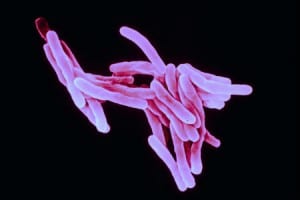Lunch Hour Lecture: Bones, mummies, tuberculosis and ancient DNA
By Ella Richards, on 18 March 2016
As World Tuberculosis Day approaches on 24 March, Dr Helen Donoghue (UCL Clinical Microbiology) ends this term’s series of Lunch Hour Lectures by looking back at 9,000 year old tuberculosis DNA.

MTB via Flickr
What is tuberculosis
Tuberculosis (TB) is an infectious disease caused by the bacterium Mycobacterium tuberculosis (MTB) that spread via aerosol and primarily affects the lungs.
Although there are current health scares about antibiotic-resistant strains of TB, due to modern sanitation, vaccination programmes and antibiotics there have not been any major TB epidemics in the UK in the 21st century. However, it is currently estimated that one third of the world’s population is infected with various strains of MTB. These infections often pass under the radar because the majority of them are latent, meaning that the infected person does not have any symptoms of the disease.
TB is one of the world’s oldest diseases, in part due to this high level of latency. There are multiple strains of MTB, all associated with differing areas of the globe. What is striking about these strains is that people with TB generally carry the strain of MTB associated with their ethnic origin, despite their current location.
For Dr Donoghue, this is evidence that MTB has evolved with humans. She argued that in the Neolithic and Palaeolithic periods, when humans lived in small populations, pathogens that were highly infectious and killed their hosts quickly failed to survive as they would simply wipe out tribes. In contrast, MTB’s combination of high latency rates and virulence means that carriers transmit the disease before dying.
What’s more, evolving with humans has meant that there are numerous strains of extinct MTB, as well as extant MTB. The research conducted by Dr Donoghue and her team means that new methods are being perfected to analyse these extinct, ancient strains. (more…)
 Close
Close

